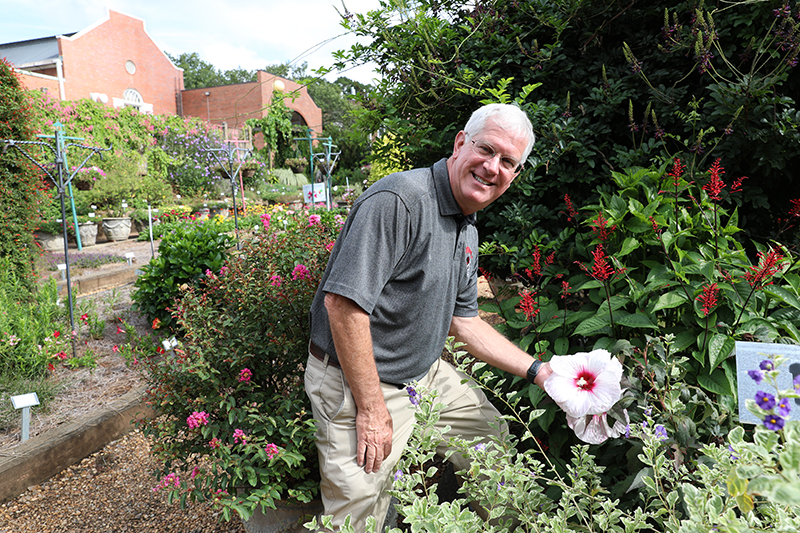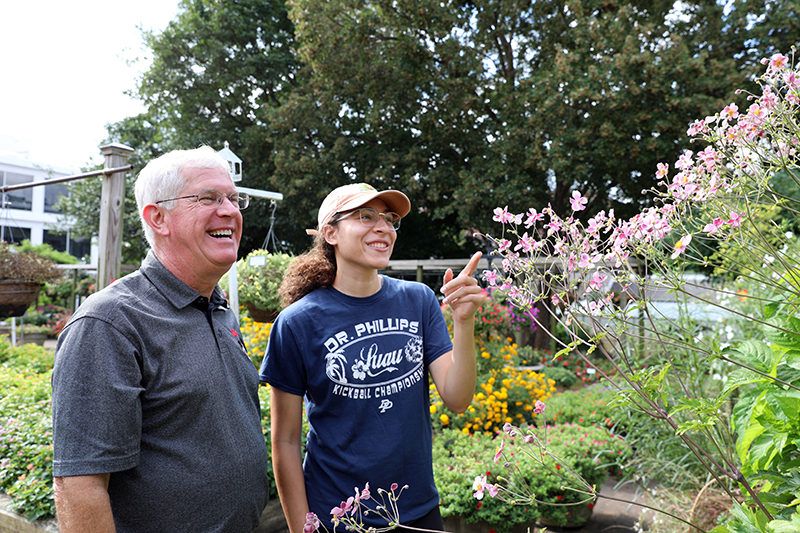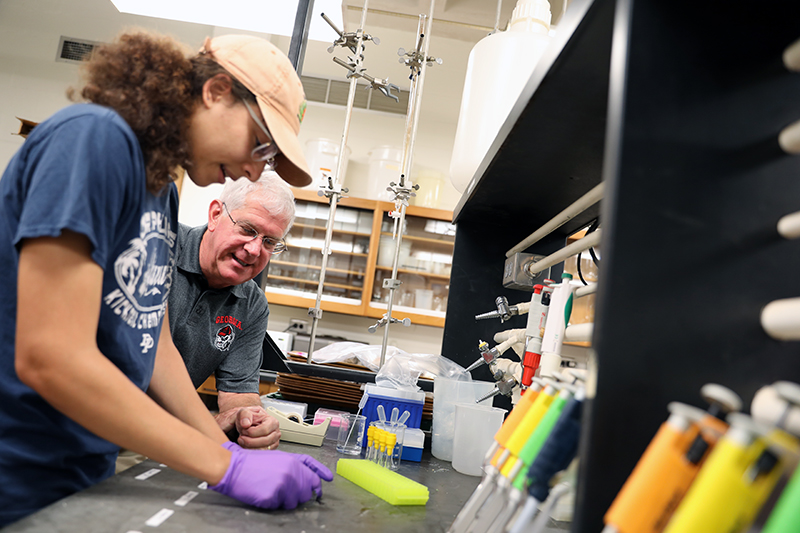Written by the UGA Graduate School
Interview with Dr. John Ruter, the Allan Armitage Endowed Professor of Horticulture and Director of the Trial Gardens at UGA

(photo by Nikki Mottley/UGA Graduate School)
Exemplifying the mission of the Graduate School through excellence in teaching, Dr. John Ruter, the Allan Armitage Endowed Professor of Horticulture and Director of the Trial Gardens at UGA, has been presented the ASHS Outstanding Graduate Educator Award for 2022 “in recognition of distinguished contributions over a period of 10 or more years to graduate education in horticultural science through exemplary instruction methods.”
In celebration of this recognition, Dr. Ruter, who is a Fellow of the American Society for Horticultural Science and the International Plant Propagators’ Society, as well as the 2021 UGA “Inventor of the Year,” talked with us about his passion for the field of horticulture, the rewards of teaching graduate students, and the importance of their contributions to research in the field.
How has your background shaped your interest in horticulture?
I grew up in the San Fernando Valley, just north of Los Angeles, CA. Back then all boys took a series of shop courses in junior high school such as woodworking, drafting, and horticulture. I found ornamental horticulture fascinating, especially plant propagation from seeds and cuttings. By the time I was in 9th grade I was working for a large wholesale nursery. Next thing you know I’ve spent 22 years as the UGA Nursery Crop research and extension specialist on the Tifton Campus. In 2011, I was selected as the Allan Armitage Endowed Professor of Horticulture. Since 2012 I’ve been on the Athens Campus teaching several courses, directing the Trial Gardens, developing an herbaceous ornamental plant breeding program, and working with graduate students.
What is your current focus of research, and what is exciting about it?
My current research focuses on developing improved ornamental selections of herbaceous and woody ornamental plants with improved tolerances to biotic and abiotic stresses. My breeding program works with many different genera, but the most successful projects have been with hardy hibiscus, hollies, and conifers.
Each batch of seed sown is exciting because you may get a new flower color, increased resistance to a pest or disease, or even a plant with nice, variegated foliage. Seeing growers showing interest in your plants and then seeing them make it into local nurseries is always exciting. I currently have graduate students working on disease resistance of new crape myrtle hybrids and developing mountain mint as a new native plant for ornamental appeal and support of pollinators.
What do you enjoy most about teaching graduate students?
Watching students develop from never having done research to becoming confident leaders in their field of study is always rewarding. I enjoy interacting with my graduate students and helping them develop ideas or solve problems. Taking students on trips and exposing them to the industry or watching them excel at meetings or presentations is also a pleasure.

(photo by Nikki Mottley/UGA Graduate School)
“Dr. Ruter is a very encouraging professor. He wants to know what his students’ interests are and provide us with the resources to explore our passions and reach our goals.” – Kaitlin Swiantek, MS Graduate Research Assistant
What hopes do you have for the future of graduate research in the field of horticulture?
Exciting time right now. New plants are the lifeblood of the nursery and floriculture industries. UGA is one of the few universities that still have ornamental plant breeding programs. We need to prepare students for success in academia and industry. Students should be cross-trained in areas such as marketing, management, business, law, etc., as well as taking traditional courses in plant breeding and genetics. Controlled Environment Agriculture and the implementation of new technologies are also exciting areas for graduate research..
How are graduate students helping with your research?
My graduate students get experience with various breeding programs by helping with weekly watering and other projects. I often assign students additional projects unrelated to their research program to help them gain experience. Graduate students are essential to moving the entire research program forward.

(photo by Nikki Mottley/UGA Graduate School)
“Dr. Ruter was an excellent mentor throughout my master’s degree and continues to be someone I turn to for advice. I always felt valued because he was intentional about setting aside time to talk with me. He helped me identify my strengths and had a huge impact on my professional development and career decisions.” – Rebekah Maynard, Ph.D. Graduate Research Assistant
What advice or words of encouragement do you have for graduate students, both conducting research in your field and in general?
A good breeder is also a good plantsman, grower, propagator, pest control specialist, and manager. Dedication, hard work, and perseverance can overcome many obstacles. Networking is essential with peers and the industry you support. Take advantage of opportunities to apply for awards and scholarships, attend meetings, and volunteer to help others. 1 Thessalonians 4:11-12 provides good guiding principles for a successful graduate degree or a career.
What does it mean to you to receive this award?
It has been a blessing to mentor numerous young scientists over my career. Watching them succeed in their chosen careers and/or raise their own families is very rewarding. Seeing your students being excited about your success and receiving the support and recognition from my peers is an encouraging experience.
